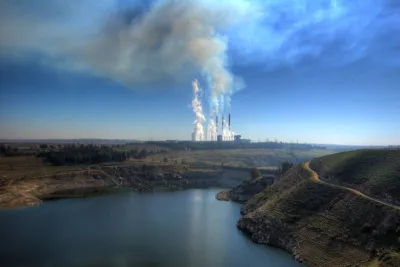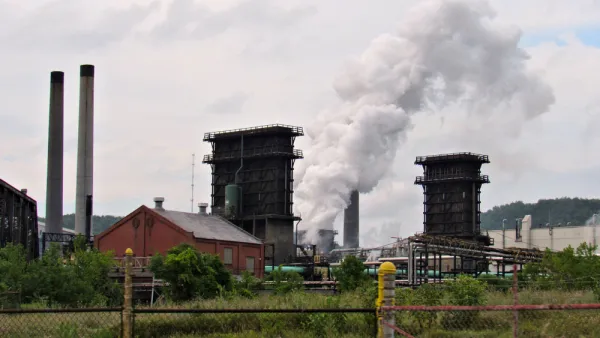A Trump administration decision not to tighten Clean Air Act restrictions on soot pollution will have more consequences for Black Americans.

Set against the context of almost daily reports of the disparate health and economic outcomes of the coronavirus pandemic for Black Americans, in addition to the racial disparities in policing that are inspiring protests all over the country, an April decision by the Trump administration to relax environmental regulations on soot, a deadly form of pollution that affects the health of Black Americans in particular, won't come as a surprise.
Soot is the leading form of environmental health risk in the United States, according to another article providing more analysis of the consequences of that decision by David Roberts:
Research has consistently found that inhaling these particles is incredibly harmful to human physiology, at high concentrations over short periods or low concentrations over extended periods. Particulate pollution is linked to increased asthma, especially among children, along with lung irritation and inflammation, blood clots, heart attacks, weakened immune systems, and, according to a wave of recent research, long-term cognitive impacts (reduced productivity, inability to concentrate, and dementia).
And more on the scientific evidence of the disparate impact of soot on Black people in the United States:
A groundbreaking 2019 study from researchers at the Universities of Minnesota and Washington attempted to quantify both sides of particulate pollution, who produces it and who suffers from it. They found that the consumption producing the pollution was concentrated in majority white communities, while exposure to the pollution was concentrated in minority communities.
The U.S. Environmental Protection Agency under Trump's leadership has decided not to tighten standards of soot pollution as determined by the Clean Air Act, which will lead to "well over 10,000 unnecessary deaths in the US every year," according to Roberts. Moreover, the decision not to regulate soot pollution, given the disparate effects for Black Americans, is "yet another way of devaluing black bodies and black lives, yet another expression of the structural racism that Trump has so effectively flushed to the surface," according to Roberts.
FULL STORY: Trump Administration's Environmental Policies Have Consequences for Black Lives

National Parks Layoffs Will Cause Communities to Lose Billions
Thousands of essential park workers were laid off this week, just before the busy spring break season.

Retro-silient?: America’s First “Eco-burb,” The Woodlands Turns 50
A master-planned community north of Houston offers lessons on green infrastructure and resilient design, but falls short of its founder’s lofty affordability and walkability goals.

Delivering for America Plan Will Downgrade Mail Service in at Least 49.5 Percent of Zip Codes
Republican and Democrat lawmakers criticize the plan for its disproportionate negative impact on rural communities.

Test News Post 1
This is a summary

Test News Headline 46
Test for the image on the front page.

Balancing Bombs and Butterflies: How the National Guard Protects a Rare Species
The National Guard at Fort Indiantown Gap uses GIS technology and land management strategies to balance military training with conservation efforts, ensuring the survival of the rare eastern regal fritillary butterfly.
Urban Design for Planners 1: Software Tools
This six-course series explores essential urban design concepts using open source software and equips planners with the tools they need to participate fully in the urban design process.
Planning for Universal Design
Learn the tools for implementing Universal Design in planning regulations.
EMC Planning Group, Inc.
Planetizen
Planetizen
Mpact (formerly Rail~Volution)
Great Falls Development Authority, Inc.
HUDs Office of Policy Development and Research
NYU Wagner Graduate School of Public Service





























